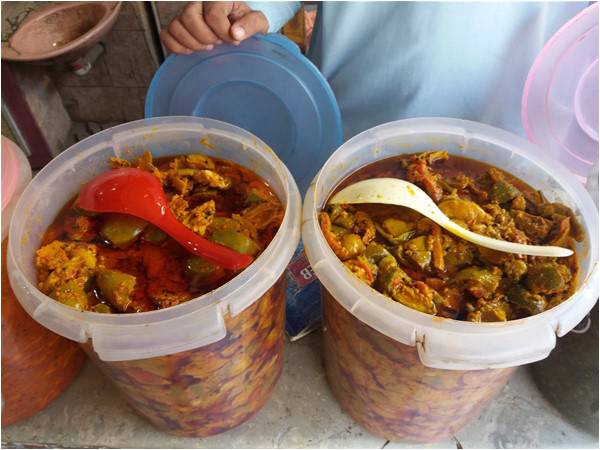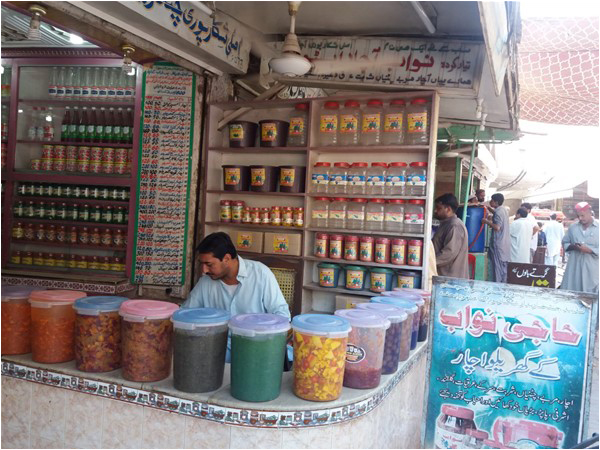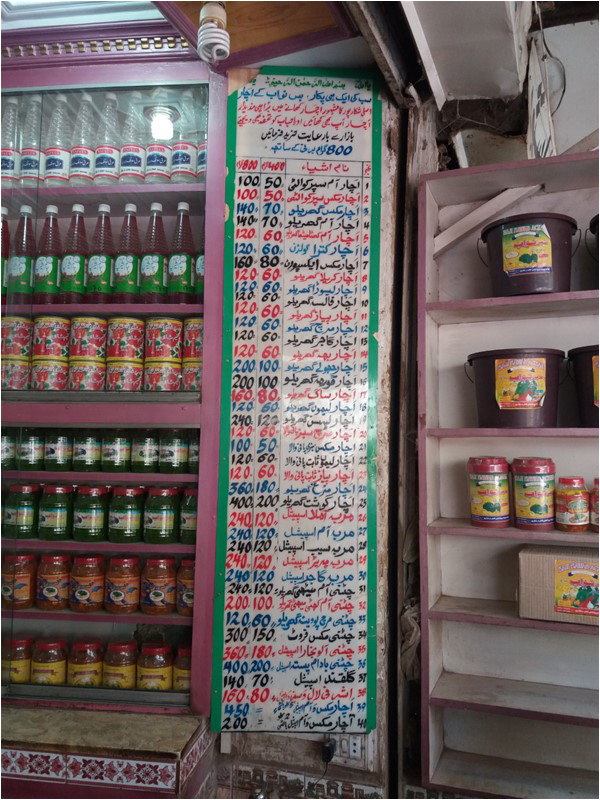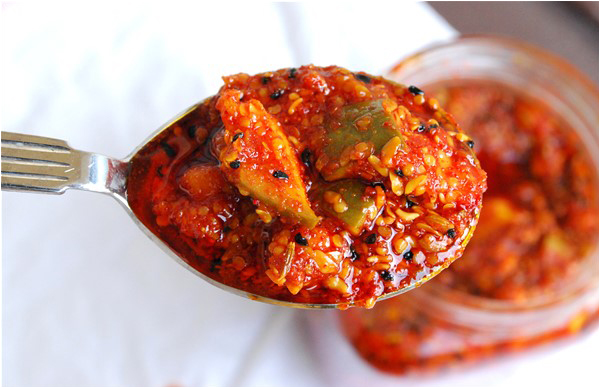
The district of Shikarpur enjoys recognition throughout the province of Sindh itself, due to its charm: narrow streets and monumental buildings. Moreover, it is known for being a centre of education and for its sweet water.
But throughout Pakistan, it is even better known for a most prestigious product – one that allows it to find its way into the hearts of so many via their taste buds. Shikarpur is eminent for its achar (pickle), the most famous and delicious variety of that popular and daily accompaniment to so many meals. It is this widespread consumption of achar that has made Shikarpur a household name amongst Pakistanis – whether they live in the home country or abroad.

Shikarpuri Achar as a food item can only be described as an intense gastronomical experience – with tangy, almost intoxicatingly attractive flavours. The techniques through which it is produced are difficult to reproduce elsewhere, as the reader will discover.
As for Shikarpur itself, there are many achar shops in the city, but the most famous and well-established ones include Nawab Achar House, Sikandar Achar House, Saleemi Achar House, Shahnawaz Achar House, Moula Bakhsh Memon Achar House and other small achar shops. Aside from the established large-scale manufacture of the delightful product, achar also represents a significant cottage industry in the town. Homemade achar from Shikarpur enjoys a high level of prestige on the market – and it also has great importance as a dependable source of income for women in Shikarpur.

There are many popular varieties but some are particularly famous. These include Mixed Achar, Mango Achar, Carrot Achar, Sweet and Sour Achar and so on.
But Shikarpur also produces a wide range of other famous and costly varieties of achar: Chicken, Plum, Cauliflower, Chickpea, Garlic, Whole Green Chili, Lemon and Onion. Deedar Ali Sethar, proprietor of Nawab Achar House is an old trader of these products from Shikarpur.
He lets me in on at least part of the secret behind these pickles: the use of the sweet oil and sweet water of Shikarpur. “Shikarpur has sweet groundwater, and that makes the taste of Shikarpuri Achar uniquely delicious!” he says.
Not only are these products indispensable in most Pakistani homes, they also cost far less in Shikarpur than anywhere else. The 800g bottle of mixed pickle costs a mere Rs. 120 and the 400g bottle, predictably, half that amount.
The women of Shikarpur have been making achar at their homes for generations. Though the homemade product is relatively simple in terms of the style in which it is prepared, it can actually cost much more than that which is commercially available in the shops – testifying to how prized it is amongst consumers. The homemade pickle is often sold directly from households who engage in its production.

The pickle traders of Shikarpur also export their product to other parts of the country and, of course, abroad. Businessmen from other parts of the country including KP, Balochistan and Punjab have long been purchasing achar from Shikarpur and have established their own shops and cabins at their respective cities – and alongside the Indus and national highway – to attract buyers.
Zahid Bhanbhro, a social worker from Shikarpur, tells me that the achar is also exported aboard – finding many customers in countries such as Saudi Arabia, the United Arab Emirates and the United Kingdom.
Above all, the people of Shikarpur are able to win a place in the hearts of friends all over Pakistan and the world – simply by sending them gifts of the delightfully tangy condiment. Without a doubt, many such gifts will have been sent around the world this Ramazan too!
But throughout Pakistan, it is even better known for a most prestigious product – one that allows it to find its way into the hearts of so many via their taste buds. Shikarpur is eminent for its achar (pickle), the most famous and delicious variety of that popular and daily accompaniment to so many meals. It is this widespread consumption of achar that has made Shikarpur a household name amongst Pakistanis – whether they live in the home country or abroad.

Shikarpuri Achar as a food item can only be described as an intense gastronomical experience – with tangy, almost intoxicatingly attractive flavours. The techniques through which it is produced are difficult to reproduce elsewhere, as the reader will discover.
As for Shikarpur itself, there are many achar shops in the city, but the most famous and well-established ones include Nawab Achar House, Sikandar Achar House, Saleemi Achar House, Shahnawaz Achar House, Moula Bakhsh Memon Achar House and other small achar shops. Aside from the established large-scale manufacture of the delightful product, achar also represents a significant cottage industry in the town. Homemade achar from Shikarpur enjoys a high level of prestige on the market – and it also has great importance as a dependable source of income for women in Shikarpur.

There are many popular varieties but some are particularly famous. These include Mixed Achar, Mango Achar, Carrot Achar, Sweet and Sour Achar and so on.
But Shikarpur also produces a wide range of other famous and costly varieties of achar: Chicken, Plum, Cauliflower, Chickpea, Garlic, Whole Green Chili, Lemon and Onion. Deedar Ali Sethar, proprietor of Nawab Achar House is an old trader of these products from Shikarpur.
He lets me in on at least part of the secret behind these pickles: the use of the sweet oil and sweet water of Shikarpur. “Shikarpur has sweet groundwater, and that makes the taste of Shikarpuri Achar uniquely delicious!” he says.
"Shikarpur has sweet groundwater, and that makes the taste of Shikarpuri Achar uniquely delicious!"
Not only are these products indispensable in most Pakistani homes, they also cost far less in Shikarpur than anywhere else. The 800g bottle of mixed pickle costs a mere Rs. 120 and the 400g bottle, predictably, half that amount.
The women of Shikarpur have been making achar at their homes for generations. Though the homemade product is relatively simple in terms of the style in which it is prepared, it can actually cost much more than that which is commercially available in the shops – testifying to how prized it is amongst consumers. The homemade pickle is often sold directly from households who engage in its production.

The pickle traders of Shikarpur also export their product to other parts of the country and, of course, abroad. Businessmen from other parts of the country including KP, Balochistan and Punjab have long been purchasing achar from Shikarpur and have established their own shops and cabins at their respective cities – and alongside the Indus and national highway – to attract buyers.
Zahid Bhanbhro, a social worker from Shikarpur, tells me that the achar is also exported aboard – finding many customers in countries such as Saudi Arabia, the United Arab Emirates and the United Kingdom.
Above all, the people of Shikarpur are able to win a place in the hearts of friends all over Pakistan and the world – simply by sending them gifts of the delightfully tangy condiment. Without a doubt, many such gifts will have been sent around the world this Ramazan too!

